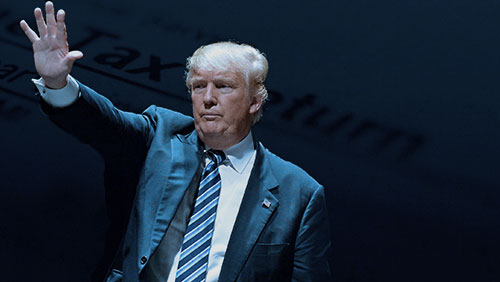Unless you are a state gambling official, presumptive Republican nominee Donald Trump will never show you his tax returns.
 The real estate mogul-turned politician has drawn flak for refusing to release his tax returns until the Internal Revenue Service wraps up its ongoing state audit, saying that there’s nothing to learn from them.
The real estate mogul-turned politician has drawn flak for refusing to release his tax returns until the Internal Revenue Service wraps up its ongoing state audit, saying that there’s nothing to learn from them.
CNN investigation, however, showed that Trump has actually handed over his tax returns to state gambling officials in Pennsylvania and New Jersey – while in the midst of state audits. Trump reportedly submitted these documents as part of the process of seeking casino licenses in the two states.
When Trump attempted to build a casino in Philadelphia, his lawyers submitted his tax returns from 2000 to 2004 in a set of documents before the state’s Gaming Control Board.
The state gaming regulators received the documents on February 9, 2006, even if some of the federal and state tax returns were subject of ongoing audits at the time.
In New Jersey, Trump furnished the state’s Casino Control Commission with five years’ worth of tax returns in compliance with the state law’s requirement for casino license applicants.
Sought for his comment, Trump’s spokeswoman Hope Hicks said in an e-mailed statement to CNN: “Trump has always said that when the routine audit is complete, he would release his tax returns.”
Since the 1970s, US presidential candidates have traditionally let the public scrutinize their tax returns to demonstrate their independence and transparency.
Hillary Clinton, the leading presidential nominee of the Democrats, has released 15 years of her tax returns while her party rival, Bernie Sanders, only shared his 2014 tax return.
Trump, for his part, has justified his decision not to show his returns to the public, saying that he doesn’t believe voters are interested in them.
His pronouncement has caught the ire of former Republican Party presidential nominee Mitt Romney, who posted on his Facebook account: “There is only one logical explanation for Mr. Trump’s refusal to release his returns: there is a bombshell in them. Given Mr. Trump’s equanimity with other flaws in his history, we can only assume it’s a bombshell of unusual size.”
In response, Trump tweeted: “In interview I told @AP that my taxes are under routine audit and I would release my tax returns when audit is complete, not after election!”
The brash-talking businessman has run a presidential campaign with a vow to “take the brand of the United States and make it great again” but his critics doubt whether he could steer the country’s fragile economy, given his past business failures, including Trump Casinos.
Trump’s first venture in the gaming business was in 1991, when he built the $1 billion Taj Mahal Casino in Atlantic City. The following year, Trump filed for Chapter 11 bankruptcy protection and he was forced to give up half his stake in the casino in order to restructure his $3 billion debts.
The famous Atlantic City casino soon became a part of Trump Hotels & Casino Resorts, an umbrella company for Trump’s hospitality and gambling properties. The company was reported to file for bankruptcy for three times: first in 2004, then again in both 2009 and 2014 under its new name of Trump Entertainment Resorts Inc.
Trump has defended his bankruptcy record as merely part of doing business.
Las Vegas Sands CEO/chairman/potentate Sheldon Adelson, meanwhile, has thrown his support to Trump in his presidential bid, saying that “someone with that level of CEO experience would be well-trained for the job of president.”
In an opinion published in the Washington Post, Adelson urged all Republicans to rally behind Trump if they wanted to beat Clinton or Sanders in the upcoming November polls.
“He is a candidate with actual CEO experience, shaped and molded by the commitment and risk of his own money rather than the public’s. He is a CEO success story that exemplifies the American spirit of determination, commitment to cause and business stewardship,” Adelson said.
“You may not like Trump’s style or what he says on Twitter, but this country needs strong executive leadership more today than at almost any point in its history,” he added.